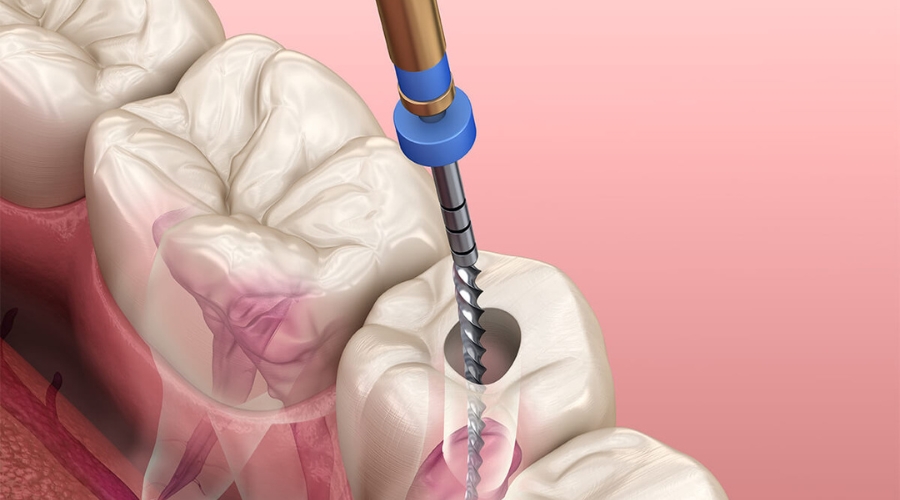Dental health is often overlooked until discomfort becomes too apparent to ignore. Amidst the array of potential oral issues, one procedure stands out as both feared and essential—the root canal. Understanding the signs that precede this intervention is crucial for maintaining optimal oral health. In this blog, we’ll navigate through the intricacies of dental well-being and explore nine common signs that indicate the need for a root canal.
Lingering Pain
Pain is the body’s alarm system, and persistent dental pain is a significant indicator that something might be amiss. Lingering discomfort, especially after consuming hot or cold beverages, could signify an infection deep within the tooth. This lingering pain is often the result of inflammation or damage to the dental pulp, necessitating a closer examination by a dental professional.
Sensitivity to Hot and Cold
If you find yourself wincing when sipping a hot cup of coffee or cringing at the cold touch of ice cream, it might be more than just a sensitivity issue. Extreme discomfort when exposed to hot or cold temperatures can be a sign that the nerves inside your tooth are compromised. A root canal may be the solution to alleviate this sensitivity and prevent further damage.
Swollen Gums
Swollen, tender gums are a red flag for potential dental problems. When the roots of a tooth become infected, the surrounding gums may swell as the body attempts to fight off the infection. This inflammation can lead to tenderness, discoloration, and even the development of a pimple-like bump on the gums, known as a dental abscess. Addressing these symptoms promptly is vital to prevent the infection from spreading.
Discolored Tooth
A change in tooth color can be indicative of various dental issues, and discoloration is no exception. A tooth that has turned gray or dark yellow may signal damage or infection within the pulp. This discoloration occurs as the blood vessels and nerves inside the tooth deteriorate. A root canal can help restore the tooth’s health and prevent further discoloration.
Persistent Bad Breath
Bad breath, or halitosis, is often linked to poor oral hygiene, but persistent bad breath despite proper care could be a sign of an underlying issue. An infected tooth can release unpleasant odors, affecting your breath. If regular brushing, flossing, and mouthwash fail to combat persistent bad breath, consult your dentist to rule out any dental infections that might require a root canal.
Pimple on the Gums
The appearance of a pimple-like bump on the gums, known as a dental abscess, is a clear indication of infection. This painful bump can develop at the site of the infected tooth, signaling the presence of pus. In such cases, a root canal becomes necessary to eliminate the infection, alleviate pain, and prevent further complications.
Painful Chewing
Experiencing pain while chewing can be a sign that the pulp inside your tooth is compromised. The pressure exerted during chewing can exacerbate the discomfort, and if left untreated, it may lead to more severe issues. Consulting with your dentist and addressing the pain promptly can help determine whether a root canal is necessary to restore the tooth’s functionality.
Cracked or Chipped Tooth
A cracked or chipped tooth may expose the inner layers to bacteria, increasing the risk of infection. Even if the damage seems minor, it’s essential to seek professional advice to assess the extent of the injury. A root canal might be recommended to prevent infection and preserve the structural integrity of the tooth.
Previous Dental Procedures
If you’ve undergone extensive dental work, such as multiple fillings or a large dental crown, there’s an increased risk of the tooth’s pulp becoming compromised. Keep a vigilant eye on any changes in sensation, pain, or discoloration in these teeth, as they may be indicative of the need for a root canal.
Recognizing the signs that point to the need for a root canal is paramount. From persistent pain to discoloration and swollen gums, our bodies often provide subtle signals that something is amiss within our mouths. Timely intervention is crucial to prevent the escalation of dental issues and maintain optimal oral well-being. If you notice any of the mentioned signs, don’t hesitate to consult with your dentist. Remember, a root canal isn’t just a procedure to fear; it’s a solution to preserve your smile and overall health. Embrace the importance of regular dental check-ups, maintain good oral hygiene practices, and stay attuned to the whispers of discomfort from your teeth. Your radiant smile is worth the care and attention it deserves.




